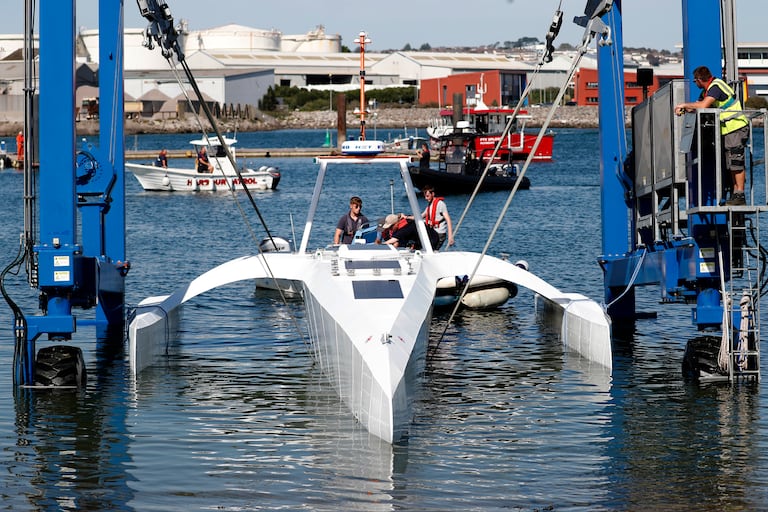The autonomous vessel Mayflower, in Plymouth Harbor in September 2020.Alastair Grant / AP
The CTA, the association that organizes the CES in Las Vegas, the largest consumer technology congress in the world held this year virtually, has been awarding innovation awards for 45 years to recognize both the design and engineering behind the most amazing products on the planet.
Last year a rotating television, a heated bed and a toothbrush that teaches how to brush your teeth were awarded.
These are some of the most original devices awarded in this edition, which takes place between January 11 and 14.
Wearable technology
The
wearables
literally wearable technology, which we stuck to the body-, in combination with remote consultations, have the potential to reduce in -
person visits to health centers or hospitals.
BioButton is a coin-sized disposable portable medical device that has won the
wearable
technology category
.
It is designed to monitor a person's temperature, heart rate and respiratory rate in real time.
In this way, its objective is to detect possible symptoms of Covid-19 while the user goes to school, to work or stays at home.
Simply put the device on your chest and download an app.
It is for single use and according to BioIntelliSense, the company that developed it, it can monitor indicated vital signs for up to 90 days.
Accessibility
People with reading disorders often have trouble recognizing words they already know and understanding the text they read, according to the National Institutes of Health (NIH).
OrCam Read is a lightweight, portable device with a smart camera that reads text from any printed surface or digital screen.
This device, winner of the accessibility category, is designed for people with a visual impairment and reading difficulties such as dyslexia and fatigue.
The user only has to point OrCam Read to a newspaper, book, product label or poster for the device to start reading for him.
Computer hardware and components
Sony's Spatial Reality Display, which costs about $ 5,000, has won an award in the category of computer hardware and components.
It is a 15.6-inch holographic screen that allows the user to view 3D images.
The optical experience would be similar to that achieved with virtual reality glasses.
"Our unique eye detection technology constantly detects the position of your eyes and delivers a bright, clear 3D image," the company states.
It remains to be seen whether this type of screen, currently designed for designers and content creators and with prohibitive prices, can gain a foothold in the market.
Digital pictures or photos
"The most compact and easy-to-use space observation station in the world."
This is how Vaonis, the company that has developed the winning device in the category of digital images or photographs, describes what Vespera is.
It is a hybrid between an intelligent telescope and a camera designed to make astronomy accessible to a greater number of users.
The device, which weighs five kilograms, measures 57 centimeters and costs $ 999, allows users to photograph the universe and share images of galaxies, nebulae or stars with friends or astronomers around the world.
Health & Wellness
An optician at home.
It's the idea behind the VROR Eye Dr. device, winner of the health and wellness category.
It is a virtual reality helmet designed for daily eye care.
The device performs an ophthalmological examination and informs the user of the results via mobile phone.
"Once damaged, your vision is irreversible," says the manufacturer, who insists that prevention with periodic examinations is the only cure.
VROR Eye Dr. performs tests with an artificial intelligence system to analyze for example visual acuity, astigmatism, color blindness or diplopia (the perception of double vision).
Smart vehicles and transportation
In September 2020, IBM announced the departure of the autonomous ship Mayflower from the UK for several research missions before meeting its goal of crossing the Atlantic in 2021. Award-winning Mayflower in the smart vehicles and transportation category, is not a conventional ship .
It has no captain and no crew.
Instead, an artificial intelligence system manages the course and makes decisions based on millions of maritime images.
Developed by IBM and the non-profit organization ProMare, the ship also collects environmental data to help understand climate change and safeguard the future of the ocean.
You can follow EL PAÍS TECNOLOGÍA RETINA on Facebook, Twitter, Instagram or subscribe here to our Newsletter.

